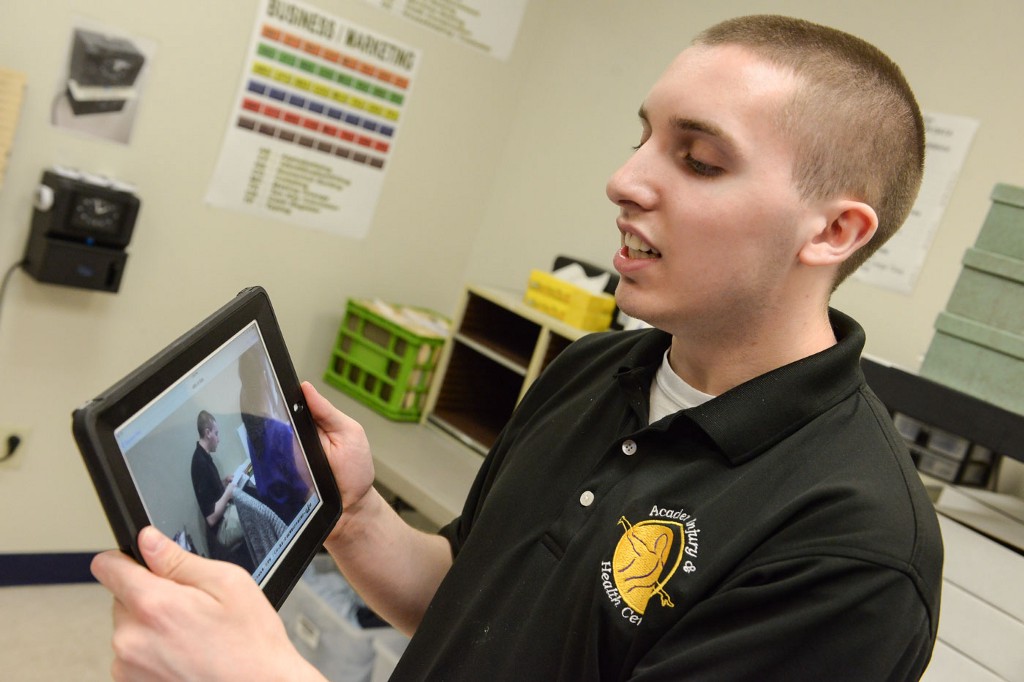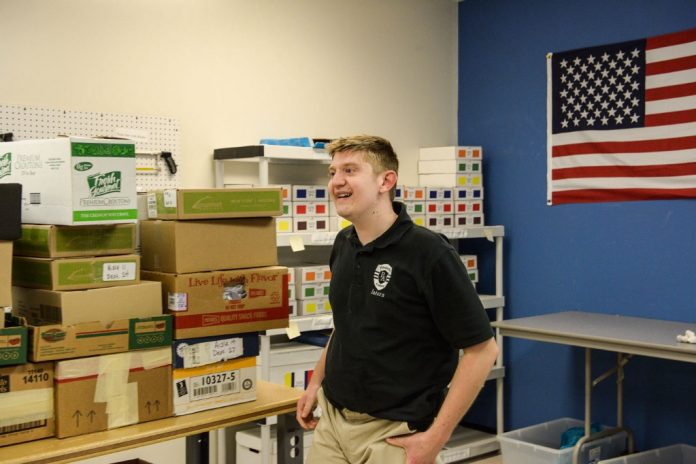Versatility in the classroom: William Devlin, 19, discusses his work while in the Practical Assessment Exploration System Lab. The classroom features a series of stations that expose students to employment opportunities in computer technology, business marketing, consumer services, processing and production, along with construction. MARIA POUCHNIKOVA / TIMES PHOTO
When Somerton residents Mike and Sue Tuckerman contemplate the future of their family, some ominous metaphors come to mind, particularly regarding their identical twin sons, 17-year-olds Mike and Eddie.
The elder Mike Tuckerman freely talks about the “cliff” that the family is rapidly approaching. Sue fears that her twins, who were diagnosed with autism and intellectual disability as toddlers, will be swept up in the “tsunami” of teens and young adults with autism who will soon lose eligibility for many of the valuable and scarce services afforded them as full-time students.
With no school and little possibility of employment, many former students will be doomed to a permanent sedentary lifestyle, according to the Tuckerman dad. Conditions could become much worse for those who lack a stable home with a supportive family. The Tuckerman twins have devoted parents and a helpful younger brother, 15-year-old Tim, in their corner. Yet, others aren’t so fortunate.
“There is a drop-off point, once they reach 18 or 21, when they’re done school,” the elder Mike Tuckerman said during a recent interview. “Without learning any skills, that’s where a lot of kids will end up, on the couch. … They call it the autism cliff. When you hit that, all of the services you fought for, they all go away.”
The Tuckermans are better positioned than most, however, because young Mike and Eddie are among about two-dozen students involved in the transition program at Philadelphia Academy Charter High School’s Tomlinson Road campus. The 6-year-old program is available to the school’s special education students and offers them community-based vocational placements and internships, along with links to potential postgraduate employment opportunities.
The program has become a key component in a continuum of special ed instruction at PACS, joining “life skill support” and “learning support” tracks that cover core subjects, pre-vocational education and adapted technology, both of which are closely intertwined with transition efforts.
“It’s better than most programs out there but we still have a long way to go,” said Cathy Adams, director of special education at PACS.
For the long term, Adams and her colleagues dream of starting an in-house business where students would gain practical work experience. However, one of the transition program’s biggest immediate needs is community partners that would be willing to fill a similar role.
About 40 area businesses and organizations have already stepped to the plate to offer training opportunities. The sites form an eclectic list, with grocery stores, restaurants, a bank, beauty salons, a pet store, a pet adoption agency, healthcare offices, senior citizen homes, child daycare centers, thrift stores, libraries, government offices, food banks, community centers and even the Pennsylvania Army National Guard.
Not all partners are active all the time, but they remain options. And that’s the point — giving students a choice.
“What we’re trying to do is person-based transition, having kids do career exploration to find out what they want to do,” Adams said.
Much of that process occurs in the school’s Practical Assessment Exploration System Lab. The large classroom features a series of stations known as career clusters that expose students to employment opportunities in computer technology, business marketing, consumer services, processing and production, along with construction and industrial. Students can decide what they like to do while teachers determine what type of work they may best be suited to do.
“It’s a simulated work environment and we gather a lot of data on their skills,” explained Donna Steel, the PACS transition coordinator.
That dynamic is particularly appealing to the Tuckermans, who know from first-hand experience that no two special education students have the same needs, not even identical twins.
The parents began noticing non-typical behaviors from young Mike and Eddie before their second birthday. Like many parents, they waited a while before seeking help, hoping that their boys would grow out of it. The youngsters were about 2–1/2 when they were both diagnosed with autism, although they had differing sets of symptoms.
“Although they are identical twins with the same diagnoses, they have very different personalities,” Sue Tuckerman said. “Often they will trigger each other’s symptoms.”
They have different interests, too. Both have worked in the grocery store at the Klein JCC stocking shelves and packaging orders for online shoppers. Mike also works at the National Greyhound Adoption Program scanning and cropping dog photos for use on adoption promotional materials.
Both teens are whiz’s with numbers and can identify the day of the week for dates far into the future.
“People with autism are not any less, they’re just different,” the elder Mike Tuckerman said.
Within the context of the transition program, placements and internships are not paid gigs. Students in grades nine through 12 spend between four and 10 hours a week in a community placement. After senior year, graduates can serve as interns from age 18 to 21, spending 20 hours a week at the job site. Again, no wages are involved. PACS supplies supervision for students and interns, along with liability insurance coverage.
Some interns, like 20-year-old Matt Lanzetta, do so well that they land permanent employment. Lanzetta spent about a year interning at Academy Injury and Health Center before getting hired permanently. He earns wages three days a week, four hours per shift, performing a variety of tasks.
“I help out filing travel cards with patients’ names. I help greet the patients. I make patients feel so welcome,” said Lanzetta, who has learned the importance of being “friendly, enthusiastic, nice, hard-working, lovable, dependable, flexible and on time.”
Lanzetta is one of the lucky ones.
“At this point, people don’t have jobs so we’re looking for any jobs,” Sue Tuckerman said. “We’re looking for variety so the kids can try different things.”
“We have some students with autism, intellectual disabilities and multiple disabilities. Even people with mild disabilities can benefit from transition,” Adams said. ••

The future is bright: Matt Lanzetta, 20, participated in the transition program at Philadelphia Academy Charter High School. The program has become a key component in a continuum of special ed instruction at PACS. He spent about a year interning at Academy Injury and Health Center before getting hired permanently. MARIA POUCHNIKOVA / TIMES PHOTO





